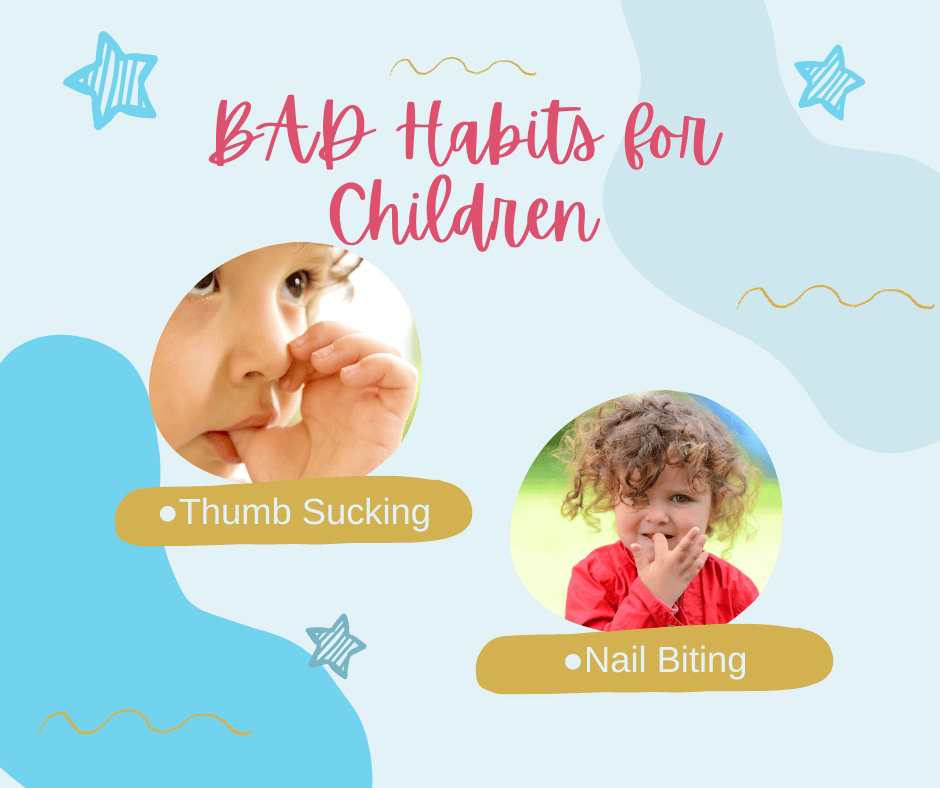Bad habits for children
Bad habits for children are repeated or habitual negative behaviors that are socially unacceptable or inappropriate.
It is important for children to outgrow bad habits in order to develop a socially acceptable demeanor.
There are some bad habits that may require monitoring because they may indicate an underlying issue, such as stress or anxiety.
In order to outgrow bad habits, focus on their causes rather than the habits themselves.
Below is a list of bad habits and some tips on how to stop them.
Related articles:
What to Do When My Toddler Bites or Hits Me! (A complete Guide)
What Can I Do When My Toddler Won’t Eat Anything But Snacks?
Five bad habits
● Thumb Sucking
A baby’s habit of thumb sucking begins soon after birth and continues for two to four years. Children require intervention if they continue sucking their fingers after the age of two to three years. A baby’s natural sucking reflex causes them to keep their thumbs or fingers in their mouths.
The act of sucking a child’s thumb initially makes them feel secure and enables them to soothe themselves when upset and fall asleep.
In spite of the fact that thumb sucking might not be a concern until the child’s permanent teeth form, if the habit persists, it can affect how the teeth line up and cause other dental issues.
● How to stop thumb sucking
- Offer rewards whenever your child stops doing the habit if they are of an understandable age.
- Identify when thumb sucking usually occurs and take steps to comfort the child in other ways to prevent this.
- You can gently remind your child to stop if they are doing it unconsciously.
● Nail Biting
It’s not just children who bite their nails when they’re stressed, but also adults. If nail biting is not considered as a bad habit for a child and it isn’t corrected during childhood, it will persist into adulthood.
According to the US-based Nemours Foundation, children and teens bite their fingernails 30–60% of the time.
Many believe that nail-biting is a result of nervousness however, the exact cause is unknown.
 ● How to stop nail biting
● How to stop nail biting
- You should address the cause of your child’s nail biting if you agree that the cause is stress or tension.
- Keep them busy. Make some playdough or paper crafts in their hands, or apply some nail polish to their nails.
- If your child is older, try explaining why it is among bad habits for a child to bite their nails and ask them to stop.
- Praise and reward them.
● Lip Biting/Sucking/Licking
The lip sucking habit may cause your child’s lower lip to get chapped or dry frequently.
It can also cause:
- dry lips
- anxiety
- misaligned teeth
Some people may bite their lips or suck their lips if their upper teeth protrude over their lower teeth.
As a result of this their lips and skin around the mouth may become red, swollen, and irritated from persistent lip sucking or biting. Additionally, it can cause pain and discomfort and damage lip tissue in some cases.
● How to stop child lip biting
- If your child has dry and chapped lips, apply lip balm or petroleum jelly.
- Attempt to distract them from biting their lips if they’re under stress.
- Keep their lips hydrated by drinking more water.
- Distract them from lip sucking by giving them sugar-free candies.
● Nose Picking
Nose picking is a common habit among children of all ages. Mucus buildup or boredom may cause children to pick their nose. Nose picking may cause nose bleeds or introduce bacteria and viruses into the body.
● How to stop children from picking their nose
- Ask them to wash their hands every time they pick their nose. The inconvenience of washing hands will deter them from doing it.
- To prevent younger children from picking their noses, put on mittens or hand gloves.
- In order to prevent bleeding and infection inside the nose, cut their nails.
- You can keep their nose moist by applying saline drops, using humidifiers, or nasal gel.
- Make arts and crafts that children can do with their hands to keep them occupied.
● Hair Twirling
Children can twirl their hair as a result of stress or boredom. Around the age of three, toddlers commonly engage in this self-soothing activity. By the age of four, it should generally subside.
Your toddler might need to be monitored if they exhibit other signs of anxiety, such as not talking or being lost in their thoughts while pulling their hair.
Don’t miss: How to stop a child from chewing on their fingers?
● How to stop hair twirling
- Hair twirling is more common in children with long hair. In this case, a short haircut would be appropriate.
- Encourage them to participate in other activities that they might enjoy, such as dancing and cycling benefits for children.
- Persuade them to stop doing it by talking to them.
- Try to address the cause.
To visit our nursery in Dubai, Book a tour now!









